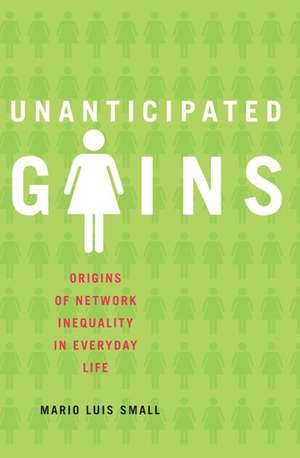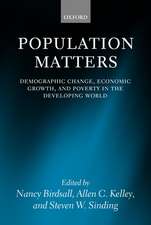Unanticipated Gains: Origins of Network Inequality in Everyday Life
Autor Mario Luis Smallen Limba Engleză Paperback – 25 noi 2010
| Toate formatele și edițiile | Preț | Express |
|---|---|---|
| Paperback (1) | 190.08 lei 31-37 zile | |
| Oxford University Press – 25 noi 2010 | 190.08 lei 31-37 zile | |
| Hardback (1) | 307.32 lei 31-37 zile | |
| Oxford University Press – 16 iul 2009 | 307.32 lei 31-37 zile |
Preț: 190.08 lei
Preț vechi: 204.21 lei
-7% Nou
Puncte Express: 285
Preț estimativ în valută:
36.37€ • 39.63$ • 30.65£
36.37€ • 39.63$ • 30.65£
Carte tipărită la comandă
Livrare economică 12-18 aprilie
Preluare comenzi: 021 569.72.76
Specificații
ISBN-13: 9780199764099
ISBN-10: 0199764093
Pagini: 312
Ilustrații: 10 b/w illus. N
Dimensiuni: 156 x 234 x 17 mm
Greutate: 0.44 kg
Editura: Oxford University Press
Colecția OUP USA
Locul publicării:New York, United States
ISBN-10: 0199764093
Pagini: 312
Ilustrații: 10 b/w illus. N
Dimensiuni: 156 x 234 x 17 mm
Greutate: 0.44 kg
Editura: Oxford University Press
Colecția OUP USA
Locul publicării:New York, United States
Recenzii
Child care centers are not just about caring for children. Rather, under the right circumstances, they also foster invaluable community ties among moms. That was a crucial fact about the first kindergartens a century ago, and it is the central lesson of Mario Small's important new book. Unanticipated Gains has important implications for anyone concerned about how to reweave the fabric of American communities.
In this supreme work, Mario Luis Small does nothing less than transform the way that we understand social capital. With meticulous ethnographic fieldwork and a large body of data, he argues that social capital should no longer be conceptualized as individual action divorced from organizational context. To say that this multi-method case study is necessary reading alongside Coleman, Bourdieu, and Wilson is an understatement. Unanticipated Gains provides enormous leverage in explaining social inequality. Small provides a bold new agenda for sociology.
Unanticipated Gains is a major contribution to the growing literature on social capital. Mario Small's original model of how social capital is influenced by organizational conditions is brilliantly applied to a case study of the experiences of mothers whose children were enrolled in child-care centers in New York. In the process he uncovered mechanisms that produce and perpetuate inequality in personal networks, and thereby provides direction for future research. Indeed, his notion of the 'organizational isolate' will become a key concept in future studies of formal organizations.
In Unanticipated Gains, Small suggests an entirely new way to think about our social relationships, situating them within the organizations that we work for, join, and patronize. Small keenly uncovers how these organizations set the parameters of our social worlds, and with an impressive variety of data, he shows that differences in organizations' brokering power is an overlooked source of inequality. This is a supremely smart book that makes it impossible to go back to the old ways of studying individuals outside of the groups within which they live their lives.
In his compelling new book, Unanticipated Gains, Mario Small joins sociological theory with detailed empirical evidence to show us how childcare centers generate much-needed social capital in low-income communities. I'll never enter a childcare center again without thinking about this book!
In this supreme work, Mario Luis Small does nothing less than transform the way that we understand social capital. With meticulous ethnographic fieldwork and a large body of data, he argues that social capital should no longer be conceptualized as individual action divorced from organizational context. To say that this multi-method case study is necessary reading alongside Coleman, Bourdieu, and Wilson is an understatement. Unanticipated Gains provides enormous leverage in explaining social inequality. Small provides a bold new agenda for sociology.
Unanticipated Gains is a major contribution to the growing literature on social capital. Mario Small's original model of how social capital is influenced by organizational conditions is brilliantly applied to a case study of the experiences of mothers whose children were enrolled in child-care centers in New York. In the process he uncovered mechanisms that produce and perpetuate inequality in personal networks, and thereby provides direction for future research. Indeed, his notion of the 'organizational isolate' will become a key concept in future studies of formal organizations.
In Unanticipated Gains, Small suggests an entirely new way to think about our social relationships, situating them within the organizations that we work for, join, and patronize. Small keenly uncovers how these organizations set the parameters of our social worlds, and with an impressive variety of data, he shows that differences in organizations' brokering power is an overlooked source of inequality. This is a supremely smart book that makes it impossible to go back to the old ways of studying individuals outside of the groups within which they live their lives.
In his compelling new book, Unanticipated Gains, Mario Small joins sociological theory with detailed empirical evidence to show us how childcare centers generate much-needed social capital in low-income communities. I'll never enter a childcare center again without thinking about this book!
Notă biografică
Mario Luis Small is Associate Professor of Sociolgy and the College at the University of Chicago. He is author of Villa Victoria: The Transformation of Social Capital in Boston Barrio (Chicago 2004) which was awarded the 2004 C. Wright Mills Award from the Society for the Study of Social Problems and the 2005 Robert E. Park Award for Best Book from the Community and Urban Sociology Section of the American Sociological Association.













